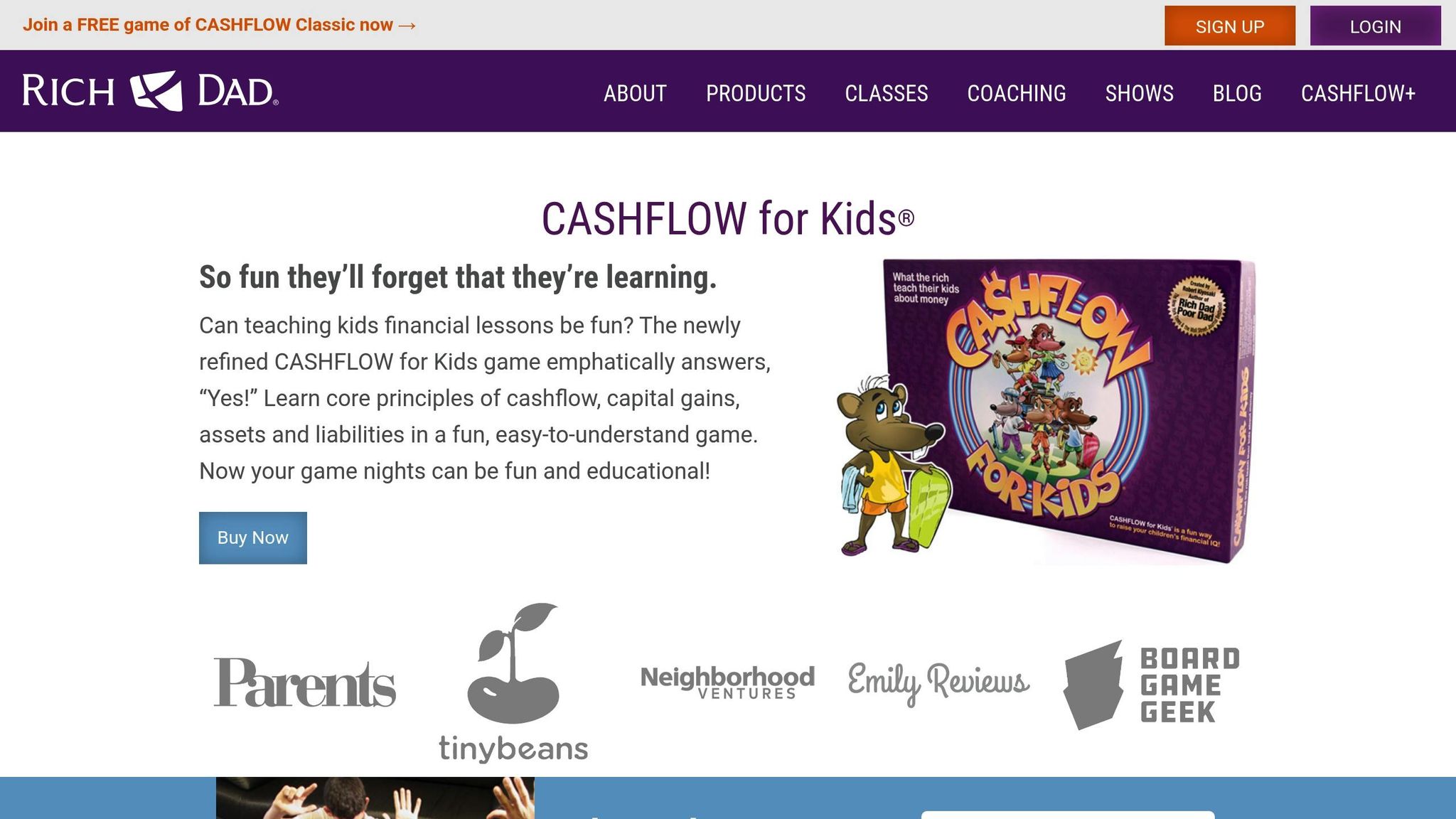Discover the Best Board Games for Every Player

How Money Board Games Teach Financial Skills
Want to teach financial skills in a fun way? Money-themed board games can help! These games turn complex concepts like budgeting, investing, and managing credit into hands-on lessons. Here's what you can learn:
- Money Management: Practice saving, spending, and budgeting with games like Monopoly and Pay Day.
- Investment Basics: Explore risk, diversification, and market timing in games such as The Stock Market Game.
- Loans and Credit: Understand debt and interest through mechanics in The Game of Life.
Quick Picks:
- Monopoly: Property investment and negotiation (Ages 8+, 90–180 mins)
- The Game of Life: Career and life planning (Ages 8+, 60 mins)
- Cashflow for Kids: Asset building for younger players (Ages 8–12, 45–60 mins)
These games make learning about money engaging for all ages. Ready to turn family game night into a financial literacy lesson? Let’s dive in!
Money Skills in Board Games
Money Management
Board games offer a fun way to practice handling money. Players start with a set amount of cash and face decisions about how to spend, save, and invest it. Take Monopoly, for instance - players begin with $1,500 and must manage it wisely to stay in the game.
Here are some money management skills players can pick up:
- Tracking income: Keep an eye on earnings, like the $200 you get for passing GO or rent collected from opponents.
- Budgeting: Decide how to divide your funds between immediate needs and long-term plans.
- Saving for emergencies: Set aside cash for unexpected expenses or opportunities.
This kind of gameplay mirrors real-life financial decisions and helps players prepare for more advanced money challenges.
Investment Skills
Board games also introduce players to the basics of investing. They provide a risk-free space to explore strategies and understand how markets work.
Key investment lessons include:
- Spreading risk: Diversify your "portfolio" by investing in different properties or assets to reduce potential losses.
- Weighing risks: Decide between high-risk, high-reward opportunities and safer, more stable options.
- Timing the market: Learn when it’s best to buy, sell, or hold onto assets depending on the game’s conditions.
Loans and Credit
Many board games incorporate lending and borrowing, giving players a chance to manage loans and credit. These mechanics allow players to see the effects of borrowing decisions in a compressed timeline.
Key takeaways include:
- Understanding interest: See how borrowed money grows due to interest rates.
- Managing debt: Balance loan payments with other financial priorities.
- Credit impact: Experience how borrowing choices shape future opportunities within the game.
These features let players grasp the long-term effects of financial decisions in just a few hours of play.
The Best Board Games for Teaching Kids About Money
Top Money Board Games
Dive into board games that make learning money management and financial decision-making fun. These games translate financial skills into engaging scenarios, helping players practice in a hands-on way.
Monopoly
Monopoly is a classic for understanding property investment and managing cash flow. Through property trades and dealing with unexpected expenses, players pick up skills like:
- Evaluating property value based on location and development
- Making calculated decisions when buying or selling
- Negotiating effectively during trades and deals
For a modern twist, Brain Games offers the Monopoly Ultimate Banking Edition ($39.99), featuring electronic banking to add new financial challenges.
The Game of Life
The Game of Life mirrors real-world financial choices, focusing on careers, salaries, and life events. Players can practice:
- Negotiating salaries and exploring different career paths
- Weighing insurance and investment options
- Understanding how life decisions affect finances
Brain Games provides an updated version ($34.99) with scenarios reflecting today’s financial landscape.
Cashflow for Kids

Cashflow for Kids breaks down money concepts for younger players. It introduces:
- The difference between assets and liabilities
- How to create passive income
- Basics of accounting through simple financial statements
Perfect for ages 8–12, this game lays the groundwork for essential financial understanding.
Pay Day
Pay Day is all about monthly money management. Each turn represents a month, helping players learn:
- How to budget for monthly expenses
- Managing unexpected costs
- Understanding loans and interest
With a quick 45-minute playtime, it’s great for frequent practice.
Stock Market Game
The Stock Market Game focuses on investing and market strategies. Players engage in stock trading, analyze trends, and learn diversification. Brain Games offers the latest version ($45.99), complete with digital tracking tools to enhance the experience.
| Game | Age Range | Key Financial Skills | Average Play Time |
|---|---|---|---|
| Monopoly | 8+ | Property investment, Negotiation | 90–180 mins |
| The Game of Life | 8+ | Life planning, Career choices | 60 mins |
| Cashflow for Kids | 8–12 | Asset building, Income streams | 45–60 mins |
| Pay Day | 8+ | Monthly budgeting, Debt management | 45 mins |
| Stock Market Game | 10+ | Investment strategy, Risk management | 60–90 mins |
sbb-itb-1ed942f
Making Games More Educational
Turn board games into tools that teach real financial lessons while keeping the fun alive.
Connecting Games to Real Money
Use board games to bridge the gap between play and real-world financial concepts. For example, while playing Monopoly, talk about how property investments function in your local housing market. You can even keep a journal to compare your in-game choices with actual financial outcomes to see how strategies align (or don’t!).
Focus on Specific Skills
Instead of trying to tackle everything at once, pick one or two financial concepts to focus on during each game. Here's a quick guide to help:
| Financial Skill | Game Example | Real-Life Connection |
|---|---|---|
| Budgeting | Track expenses in Pay Day | Build a personal budget |
| Investing | Buy properties in Monopoly | Learn about real estate growth |
| Managing Risk | Trade in the Stock Market Game | Understand diversification |
| Handling Debt | Manage loans in Game of Life | Grasp credit and loan responsibilities |
By narrowing your focus, you can dig deeper into each concept and make the lessons stick.
Review and Reflect
After each game session, take time to revisit the strategies you used and how they apply to real financial decisions. This reflection reinforces what you’ve learned. Try these steps:
- Break down the winning strategy and key factors behind it.
- Explore alternative approaches and connect them to real-life scenarios.
For younger players, use a Decision Review Sheet with simple prompts like:
- What was your smartest money move today?
- Which purchase helped you the most?
- What would you change next time?
This kind of review turns fun game time into a powerful learning experience.
Games for Different Ages
Pick games that align with a child’s stage of development to help them learn financial skills. As kids grow, the complexity of games should increase to reflect more advanced financial concepts.
Ages 5–8
At this age, focus on games that teach basic money skills. Look for ones that use physical coins and involve simple transactions. Keep sessions short - around 30 minutes - to help reinforce counting and basic math in a fun way.
Ages 9–13
For kids aged 9–13, choose games that introduce budgeting and saving. These games, typically lasting 45–60 minutes, encourage players to make spending decisions and manage small budgets over multiple rounds.
Ages 14–18
Teenagers are ready for more advanced financial concepts. Games like Monopoly or Cashflow for Kids can be a good foundation, but consider options that dive into portfolio management, market trends, and risk assessment. Sessions of 90 minutes or more can spark deeper strategic discussions.
Tip: Begin with simple games and gradually move to more complex ones as financial skills improve.
Conclusion
Key Takeaways
Money board games offer a fun way to improve financial literacy through hands-on play. Families can learn important skills like managing money, understanding investments, and grasping credit basics. By mimicking real-life financial decisions, these games turn tricky concepts into easy-to-understand lessons.
Here’s what they bring to the table:
- Interactive learning, safe decision-making practice, and opportunities for meaningful family conversations
- Gradual skill-building with age-appropriate challenges
This makes money board games a great choice for teaching practical financial skills.
Find the Right Game
Start your family’s financial education journey with games that fit your learning objectives. Brain Games provides a wide range of money-related board games suitable for all ages. Check out Brain Games to discover educational games that make learning about money enjoyable.
Tip: Choose games that align with your family’s financial learning goals and your kids’ ages. Younger children can start with games focusing on simple transactions, while older kids can tackle games with more advanced financial concepts as they grow.






